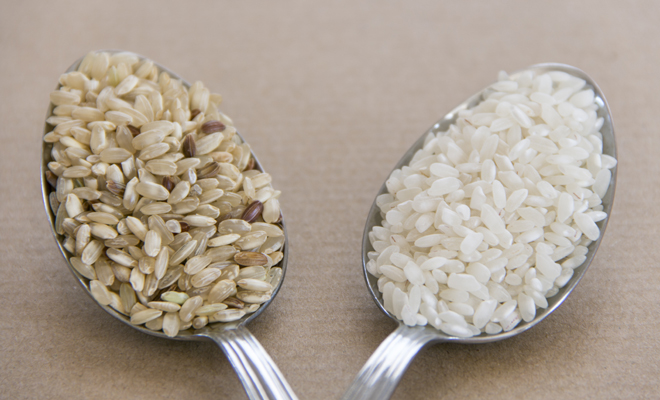Currently, the flood of information that we receive and to which we have daily access on nutrition, food, diets, ways of eating… has generated a large number of myths and false beliefs about food. What if eating fruit after eating makes you fat, if brown sugar is much better than white, if light products are ideal for losing weight…
Enough already! In this article we believe in healthy eating and a daily diet that is balanced and that really provides us with the components that our body needs to stay healthy and strong. For this reason, in our I Encounter #EntreNosotras, we invited Marina Díaz Naranjo and Axel Ceinos Moraza, dieticians and nutrition experts, to clear up our doubts once and for all regarding these issues and help us eat better. We want to share it with all of you. These are the conclusions we reached:

False beliefs about food that you should NOT believe
Luckily, every day it seems that society is becoming more aware of what you eat. Unfortunately, what we think is healthy isn’t always really healthy. But that will change from now on when you stop believing those false nutritional beliefs that circulate through our lives on a daily basis. Pay a lot of attention!
The most common myths about calories
-
Counting calories helps to lose weight or to maintain our ideal weight: FALSE.
The important thing is not the daily calories we eat, but what foods those calories come from. Many people think that they can eat whatever they want as long as it does not exceed the average amount of calories that adults usually expend daily (between 2,000 and 3,000 depending on whether you are a man or a woman). Mistake! Someone can live eating hamburgers, fries and soft drinks and not gain a pound as long as they stick to the calorie limit, but their cholesterol levels will be sky-high and they will be at great risk of diabetes or other diseases. Conclusion: we should not be obsessed with counting calories, but rather worry about eating a balanced dietrich in fruits, vegetables and fresh foods. This combined with physical exercise constitutes the best formula of all to lose weight.
-
Light foods are less fattening: FALSE.
The law stipulates that a product can be labeled as light if it contains less than 30% of calories than a similar non-light product, which does not mean that it is not fattening. In fact, as Axel Ceinos Moraza and Marina Díaz Naranjo affirm, that a certain food is labeled as light (and all the marketing that goes with it) makes many people think that they can eat large amounts of that product without gaining weight, precisely achieving the opposite effect: more calories ingested in your daily diet.
-
Whole grain products have fewer calories than white ones: FALSE.
The amounts, nutrients, and components of whole-grain products are actually very similar to their non-whole-grain counterparts. What really differentiates one from the other is the amount of fiber. Whole-grain foods have the same calories as white foods (sometimes the caloric percentage is even higher), but they contain more fiber, which has a satiating effect and helps improve intestinal transit. The conclusion that nutritionist Marina Díaz Naranjo gives us: if you have to choose, always choose whole grain products over white ones, but not because they contain fewer calories (which is uncertain) but because they will bring more benefits to your body thanks to that fiber they own.
-
The bread is fattening and the crumb much more than the crust: FALSE.
Although it is true that bread is rich in carbohydrates, a moderate consumption of it does not have to make us gain weight. As for the crumb and the crust, both make up the bread as a whole and neither is ‘fattening’ more than the other. What happens is that, due to the action of baking, the crust dehydrates while the inner part (the crumb) retains a greater amount of water, which gives it a much spongier appearance.
False myths about water
-
Water during meals makes you fat: FALSE.
Water is a caloric element, that is, it has no calories. Conclusion? It does not matter if you drink water before, during or after meals, since doing so will not add more or less calories to your daily diet. In fact, it is essential that you drink water since, in addition to being an essential component to stay hydrated, it represents a fairly large source of minerals and electrolytes necessary for the proper functioning of your body.
-
You have to drink two liters of water a day: FALSE.
How many times have we heard that you have to drink at least 8 glasses of water a day? Well, it’s 100% false! It is true that it is recommended to ingest two liters of liquid daily, but this statement does not take into account the amount of water present in many of the foods we eat, especially fruits and vegetables. What Marina Díaz does recommend is to ALWAYS avoid sugary soft drinks.
-
Bottled water is healthier than tap water: FALSE.
As Axel Ceinos Moraza tells us, this depends a lot on the water supply system of the town or country where you live. There are certain pathologies for which the consumption of bottled water is recommended due to its rich mineral content such as calcium or sodium, but in general, if the water from the place where you live is of good quality, there are no contraindications that prevent or limit your consumption.
Myths and truths about diets and weight loss
-
Some diets can help you lose 5 kilos in a week: FALSE.
It is possible to lose 5 kilos in a week, but it is most likely that after that week there will be what is known as the ‘rebound effect’, recovering the lost weight again. The important thing, as Axel Ceinos tells us, is to undergo nutritional education, that is, to learn to eat. Knowing which foods are healthy and which are not, and following a balanced diet from which we benefit in the long term.
-
Some diets can cause amenorrhea (absence of menstruation): TRUE.
Very restrictive diets that do not provide us with the necessary amount of nutrients and vitamins can end up having a negative effect on our hormones and our menstrual health.
-
Mixing carbohydrates and proteins makes you fat: FALSE.
This is what many so-called ‘dissociated’ diets propagate, but it is not really scientifically proven. It is very difficult to separate foods based on the nutrients they provide because each food is itself a mixture of nutrients. In addition, all those nutrients (fats, carbohydrates, proteins…) are necessary for the functioning of our body and to keep us healthy.
-
You should not eat carbohydrates after 6:00 p.m..: FALSE.
There is a false belief that says that eating carbohydrates at night makes us fat because after that time the activity is reduced and it is more difficult for us to burn them. That’s not true. If we eat a balanced daily diet, it is very difficult to reach the end of the day with full glycogen reserves, so if we eat carbohydrates at dinner (or after 6:00 p.m.) these will be used, first of all, for consumption. during the night (even though we are asleep, our body continues to spend calories) and, secondly, to continue filling our reserves.
The craziest myths about fruit consumption
-
Eating fruit after eating makes you fat: FALSE.
Fruit has the same amount of calories whether you eat it before, during or after meals. It is recommended to consume five pieces throughout the day as it is an important source of vitamins and minerals. What is true, as Axel Ceinos Moraza tells us, is that fruit has a high fiber content which accentuates the feeling of satiety when eating it. This has as a result that in certain slimming or weight control diets it is advisable to take it just before eating to reduce appetite and the amounts ingested in the main dishes.
-
Taking the fruit in juice is the same as taking the whole fruit: FALSE.
It must be borne in mind that to make an orange juice, for example, you do not use a single orange, but you need at least three. Taking a juice, therefore, more calories and more sugar are ingested. In addition, the juice, when taken much faster than a piece of fruit, provides less feeling of satiety and causes a large part of the pulp to be lost, which is where the greatest amount of nutrients and, above all, fiber is found. In any case, if you choose to consume juice instead of whole fruit, it is always preferable that it be natural rather than packaged, which usually contain a greater amount of added sugar.
-
If you have diabetes, you should NOT eat fruit under any circumstances: FALSE.
Fruits and vegetables should be the basis of anyone’s diet. In the case of someone diabetic, what you have to do is adjust the intake of carbohydrates (which would include the consumption of fruit) with the specific treatment, needs and lifestyle of the patient.
-
If a fruit has the same calories as a cookie, then it is the same to eat one thing than another: FALSE.
As we have mentioned previously, the important thing is not the calories but the quality of those calories and as Marina Díaz Naranjo affirms: “The important thing is not what you eat, but what you stop eating”. That is, by eating a cookie you are not eating a piece of fruit that will truly provide you with the nutrients your body needs to stay healthy.
3 totally false myths about sugar, don’t believe them!
-
Brown sugar is healthier than white sugar: FALSE.
The composition of both products is practically identical with the only difference being that the brown sugar is coated with molasses. In fact, the nutritional value of both is very similar: for every 100 grams of brown sugar there are approximately 377 calories, while the same amount of white sugar would be equivalent to about 387 calories. As you can see, an almost negligible amount. In any case, it is convenient to control the consumption of both one and the other in order to have a healthy diet.
-
We must eliminate all sugar from our diet: FALSE.
Our body needs sugar to function. The key to controlling your consumption is to eliminate refined sugars and processed products (pastries, snacks…) from our diet and take sugar correctly only through healthy foods, such as fruit or dairy products and, of course, in moderation.
-
NO sugar equals NO calories: FALSE.
A product whether or not it has sugar will ALWAYS have calories. “It is likely that if we compare a product ‘with sugar’ with one ‘without sugar’, the latter contains fewer calories, but at the price that the ingredients that make it up are of quite poor quality,” Marina Díaz tells us.
